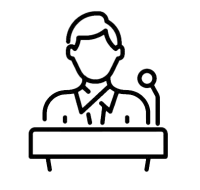The Advanced Research Careers (ARC) UE5 at UCSF program provides mentorship, training and career exploration for senior doctoral and postdoctoral scholars for a seamless transition into roles as research and teaching faculty or as researchers in the biotech industry.
About
The Advanced Research Careers (ARC) UE5 at UCSF has five structural components.
- The centerpiece of UCSFs ARC experience is the 3-day Institute where scholars participate in professional development workshops, networking activities, and establish peer coaching groups for each cohort.
- Coaching Groups: Led by senior faculty and biotech professionals, these semi-structured monthly virtual meetups are developed to discuss scholars' progress as well as personal and professional issues related to the trainees’ professional path and development.
- Monthly professional development workshops that reflect the strength-based conceptual framework in the context of the four-stage developmental framework for career development.
- Career exploration: Regional and national occupation-based salary and 10-year market growth projections, as well as IDP and occupation and job title-based skills identification.
- Access to professional career counseling through the office of Office of Career and Professional Development (OCPD) at UCSF. Each trainee will have direct access for up to three sessions of one-on-one counseling by a UCSF OCPD Career Service professional.
ARC Scholars
This program is designed to development a community of scholars across institutions as they prepare for the transition between pre-doctoral and postdoctoral training. Scholars are recipients of the NIH Advancing Research Careers (ARC) UE5 F99/K00 funding opportunity. This award is designed to facilitate the transition of promising senior doctoral and postdoctoral researchers from diverse backgrounds into independent, tenure-track or equivalent faculty positions and as researchers in the biotech industry. NIH staff will assign awarded scholars to UE5-awarded scientific and career development cohorts.
Key Components and Timeline
Years One and Two
- In-person three-day ARC UE5 institute (workshops, seminars, and networking)
- Establish peer-coaching groups
- Monthly professional development (workshops, training and skills development, guest speakers, career exploration, employment preparation and community building)
- Tools for career exploration, including IDP and portal targeted to careers for research faculty, teaching faculty and biotech professionals
- Access to professional career counseling through the Office of Career and Professional Development (OCPD)
Years Three and Four
- In-person three-day ARC UE5 institute (workshops, seminars, and networking)
- Meet with peer-coaching groups
- Monthly professional development (workshops, training and skills development, guest speakers, career exploration, employment preparation and community building)
- Exploring career options, including IDP and portal targeted to careers for research faculty, teaching faculty and biotech professionals
- Career services consultations
Professional Development Workshops
- Goal Setting and Career Planning: Envisioning Your Future
- Developing Your Teaching Philosophy and Portfolio
- Understanding the Biotech Landscape
- Collaborative Research: Building and Leading Teams
- Negotiating Offers and Making Transitions
Career-Exploration Tools
- Tutorial Videos: Positioning Yourself to Leave the PhD. The Strategic Postdoc Series, a series of tutorial videos that explore the difficulty often associated with leaving the safety of a training environment upon graduation.
- IDP The individual Development Plan is a tool used to identify desired outcomes and backwards design a training plan to map benchmarks of success and support needs
- Exploring and preparing for faculty positions: The different kinds of academic institutions in the U.S. have different priorities regarding teaching and research. They also look for different qualifications when hiring faculty. Understanding the types of institutions you want to apply to and what skills you must demonstrate is critical to receive a faculty position offer.
- Academic Career Readiness Assessment (ACRA) competency: This tool allows trainees to understand the skills, competencies and experiences they need to be competitive in different kinds of academic institutions. It provides the information needed to explore, plan and apply to faculty positions at different types of institutions.
- My Career Path: a browsable interactive, data driven web-based platform where users select an occupation or job title to access U.S. Department of Labor data on top 15 knowledge, skills (including soft skills), and abilities specific to that job.




